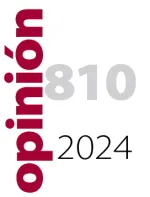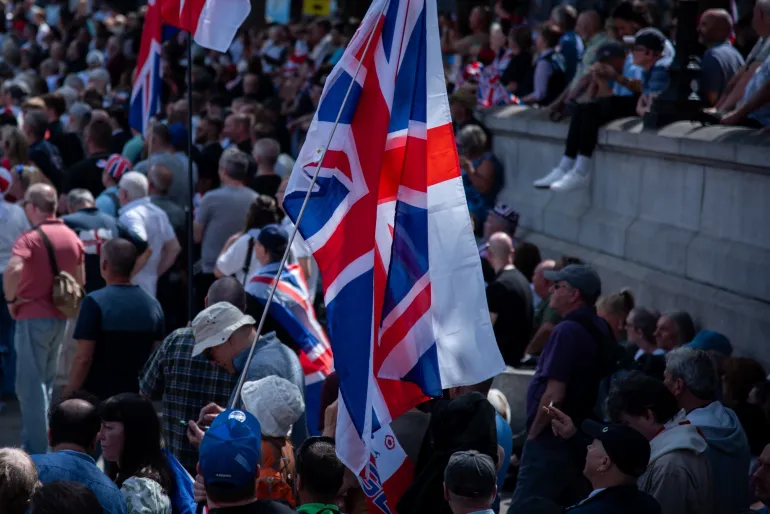Beyond Disinformation: Causes of the Race Riots in the United Kingdom


At the end of July, the murder of three young girls by a British-born youth of Rwandan parents led to violent demonstrations and direct attacks against racialised migrants in several UK cities. This was the third time in the last eleven years that a violent act perpetrated by an individual has ended up in an attempted pogrom. While most analysts emphasise the responsibility of social networks, the underlying causes are related with the definition of the nation, socioeconomic factors, and normalisation of anti-immigration discourse.
A shorter version of this article has been published in the daily ARA.
This summer has brought with it images of outright pogroms against immigrants, refugees, members of the Muslim community, and racialised people in many cities and towns of the United Kingdom. The murder of three small girls at a dance school in the coastal town of Southport sparked a series of violent attacks against individuals and groups that were totally unrelated with the Southport events. Over a period of ten days, hooded groups attacked racialised people and set fire to mosques, businesses, a refugee shelter, and a library.
No one doubts that social networks played a key role. Although the attacker was a British-born Rwandan youth, rumours stating that he was Muslim, an asylum seeker, or an undocumented immigrant soon began to circulate. Far-right activists like Tommy Robinson (with more than 800,000 followers on X), blaming “invaders” who “slaughter your daughters” or Islam itself, claiming that it is a problem of mental health, called for mobilisation. Nevertheless, explanation of this summer’s pogroms needs to delve deeper than disinformation. Race riots have been a constant in the history of the United Kingdom and the truly relevant question is: why are certain messages (which, indeed, are now spreading faster than they used to) able to crystallise so quickly into such a violent form?
The first cause is related with the definition of us. As Achille Mbembe succinctly explains, slavery and empire led to the creation of two symbolic orders, that of the community of people we recognise as close to us, as being us, and that of the community of “others”, the ones who are left out, perceived as pure “merchandise” or pure “surplus”. This division between the human and subhuman orders, which made it possible to justify the brutality of slavery and the extreme violence of colonial armies during the independence struggles is, according to Mbembe, the basis of this us/others which provides the framework of present racist discourse.
However, in the case of the United Kingdom, the British empire also had an open-door policy for more than 600 million subjects of the colonies of the Commonwealth, and this meant granting British nationality. It was the price paid for the illusion of the “empire on which the sun never sets”. Nevertheless, at the time, nobody imagined that the people who would arrive in the United Kingdom would be other than the descendants of those who had left the country. It is important to remember that, throughout modern and contemporary world history, the United Kingdom is one of the countries that has generated most emigration.
The problem arose when it quite quickly became evident that those “others” who were imagined as de facto confined to the colonies, had arrived in Britain in large numbers. By the end of the 1950s, race riots in Nottingham and Notting Hill had sounded the alarm. The response was swift. Driven by fear of the “rage” and “bad manners” of the British people, the government opted for draconian measures to put an end to the influx of non-white immigrants coming from Asia, Africa, and the Caribbean. Ever since then, the United Kingdom has been among the countries with the world’s most restrictive immigration policies.
This stringent closing of borders was justified with a double argument. On the one hand, it was assumed that immigration was a negative phenomenon for the British “people” who, as the Conservative Party politician Enoch Powell asserted, had become “foreigners in their own land”. On the other hand, a whole narrative was constructed—and this has lasted until the present day—according to which social harmony and integration of those who had arrived depended on making sure that no more immigrants entered the country. In other words, there is some degree of consensus that the less immigration there is, the more social peace and integration there will be. All this, it is true, was accompanied by anti-discrimination policies that are incomparably braver than those of other European countries.
The second reason behind this summer’s race riots is socioeconomic. Industrial relocation after the 1970s and, in particular, the neoliberal policies of Margaret Thatcher’s Conservative government led to widespread impoverishment of the working classes and state neglect of people who, in this situation, were left to fend for themselves. The last ten years of Conservative policies and the devastating effects of Brexit have only made things worse.
Meanwhile, although it may seem contradictory, the British economy has come to depend more and more on the arrival of foreign workers. At first, they were mainly European citizens. In this case, the ill-feeling mainly targeted Polish workers who were accused of stealing British jobs. It is not surprising, then, that the issue of migration was one of the key points in the debates about Brexit. When the United Kingdom left the European Union, the origins of people arriving in the country changed. They are no longer mainly European, and their numbers have kept rising. If before the pandemic the annual figure given for immigrants was 330,000, it has risen to more than 750,000 in the years since Brexit.
Finally, the political discourse of recent Conservative governments and the mass media outlets that have supported them is also responsible for the riots. Who could fail to remember the slogan “Stop the Boats” or the proposal to deport asylum seekers to Rwanda? However, it is not a mere matter of words because policies, too, have accelerated the normalisation of such discourse. In the last few years, for example, access to social services has been restricted and the right to family reunion curtailed for many foreign residents, while asylum seekers have been locked up in emergency centres that have come to the point of the grotesque resort of the semi-prison barge that has been holding them in Portland, Dorset. In this regard, as Daniel Trilling says, “the ideological fuel [of the riots] comes from ostensibly more respectable sources” than social media pundits.
However, all British politicians, including Nigel Farage, have condemned this summer’s violent disturbances. Nobody wants street thuggery or a civil war scenario, as predicted by Elon Musk. Some legislators have been mealy-mouthed in their condemnation and others more forthright although they have tried to excuse or justify the attackers’ motives. In any case, it is evident that people who play with fire get burnt. It is easy to blame far-right agitators or the perverse effects of platform algorithms. Although it is essential to regulate both, the definitive solution cannot be found without addressing the underlying causes, revising the definition of national identity, confronting social malaise by reaching out to people who feel abandoned and, finally, going beyond polarising narratives and symbolic politics, which are increasingly leaving their mark on the immigration discourse of all political forces, without exception.
Keywords: United Kingdom, riots, immigration, racism, disinformation, social media, Southport
All the publications express the opinions of their individual authors and do not necessarily reflect the views of CIDOB or its donors